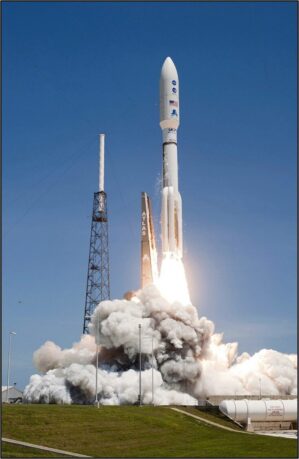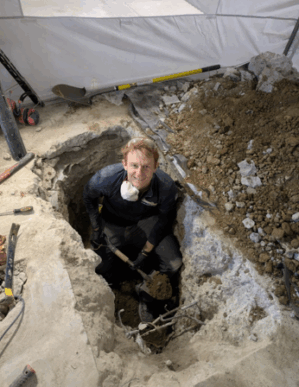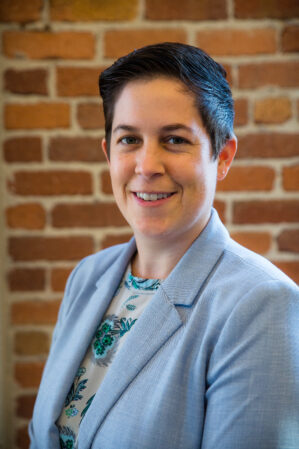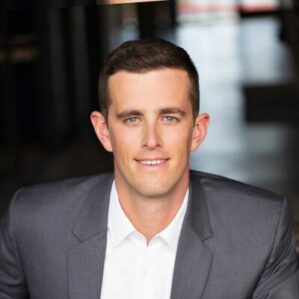For some students in Wharton’s MBA Program for Executives, the program is more than a career accelerator. It’s a direct catalyst for becoming business owners.
Here are the stories of three Wharton EMBA alumni, all military veterans, who acquired companies while enrolled in the program by leveraging finance and strategy courses, tapping into Wharton’s large network, and applying real-time insights from classmates and professors.
Caroline Chapdelaine, WG’22
CEO, Northstar Photonics | Salt Lake City, UT
A former U.S. Army intelligence officer, Caroline Chapdelaine was climbing the corporate ladder in the defense industry when she began exploring MBA programs.
“I was doing what many do in my field: trying to get to a general manager role,” Chapdelaine says. “When I walked into HR and asked how to get there, they told me I needed an MBA from a top school. That led me to Wharton.”
However, during the EMBA program, Caroline’s vision for her future shifted, as she began thinking about entrepreneurship. “Early on, I pitched a startup idea to a professor who kindly tore it apart,” she says. “That moment helped me realize I didn’t want to start something from scratch. I wanted to buy a business and run it.”
Inspired by Professor Robert Chalfin’s course on Entrepreneurship through Acquisition (ETA), Caroline immersed herself in the ETA ecosystem. “I threw myself into it by reading books, listening to podcasts, and going to conferences. Prof. Chalfin’s storytelling style and real-world examples lit a fire. Right after the class ended, I started searching for a business to acquire.”

With her defense background, she looked for niche opportunities in government contracting. Her search ended when a Wharton classmate told her about the opportunity to acquire a small subsidiary that his company planned to shut down. She made a reasonable offer and closed the deal.
Today, Caroline leads Northstar Photonics, a manufacturer of advanced navigation equipment for GPS-denied environments. “Wharton taught me to analyze financials like a public company CFO, which was something I had zero background in. I also lean heavily on the Wharton network, calling classmates for advice and support.”
Despite early challenges and contract volatility, her business is growing. “If I hadn’t gone to Wharton, none of this would have happened,” she says. “I’d still be on the corporate climb and wouldn’t have discovered this knowledge, passion and confidence for entrepreneurship.”
Dan Zastrow, WG’20
Owner & Operator, Remedy Rooter | San Diego, CA
After eight years as a nuclear submarine warfare officer in the U.S. Navy, Dan Zastrow moved into medical technology, focusing on procurement and product development. But something didn’t feel right.
“I wanted to run something, to be the final decision-maker but I had no idea how to get there,” he says.
During Wharton’s EMBA program, Dan discovered the Entrepreneurship through Acquisition ecosystem and search fund model. He recalls, “It sounded too good to be true. Investors give you money to buy a company and I get to run it?”
He and a friend launched a traditional search fund, but after 18 months without finding a suitable acquisition, they made a risky pivot to self-funding.
“We had no income. It was an arduous, uncertain path,” he says. Eventually, they found success with Remedy Rooter, a San Diego-based plumbing company. Dan explains, “I liked plumbing. It’s essential, technical, and scalable. The financials made sense, and I liked the owners.”
Today, he also co-owns In Bloom Flowers, Gifts & More in the Dallas Fort Worth area.

Running the business hasn’t been easy. “It’s like a can opener for self-growth,” he says. “Every problem traces back to you as the owner. But we’ve grown 20% year over year and have become much more stable.”
Dan credits Wharton with giving him both the skills and confidence to take the leap. “Wharton taught me how to differentiate between value creation and growth, the language of business, and decision making frameworks. The Wharton brand opened doors that wouldn’t have opened otherwise.”
Robert Kress, WG’24
CEO, Anchor Innovation | Virginia Beach, VA
When Robert Kress left the U.S. Navy in 2022, he had managed major operations—including managing nuclear reactors and SEAL Team operations—but he knew little about business. “I didn’t know what P&L stood for. I was fluent in military language but needed to learn the financial side.”
Wharton was his bridge to the private sector. At Wharton, he met a fellow veteran who had acquired a business during the program. “That blew my mind. I didn’t even know companies were for sale. Within six months, I was exploring entrepreneurship through acquisition (ETA) as a real option.”
Rob teamed up with two other Navy veterans to search for a company in a space they knew well: government services. Their strategy? Find a defense contractor where their experience could add value and scale. In 2023, they acquired Anchor Innovation, a Virginia-based firm providing training and maintenance support to the Department of Defense.

“We closed with 85 employees, and now we’re at 160. We’re scaling fast, doubling revenue and headcount in two years. Our strategy for growth is playing out and it’s very meaningful taking care of the team and providing critical support to the US Navy,” he says.
Along the way, Rob turns to Wharton for support. “My classmates helped me write the business plan and prepare for underwriting with the bank. I crowdsourced deal advice from lawyers, bankers, entrepreneurs. I went to professors’ office hours for tax and negotiation strategies. I hadn’t even taken Prof. Chalfin’s class on Entrepreneurship through Acquisition yet, and he was advising me on the deal.”
Today, Rob says he is applying what he learned in real-time: “Wharton did more than just prepare me, it was critical getting me here.”
By Meghan Laska
Posted: August 18, 2025






